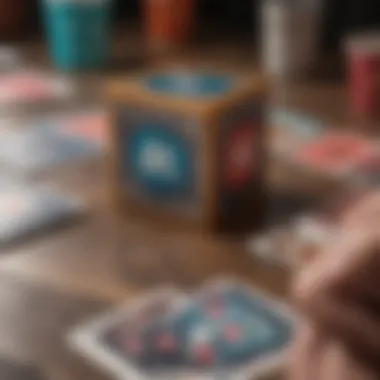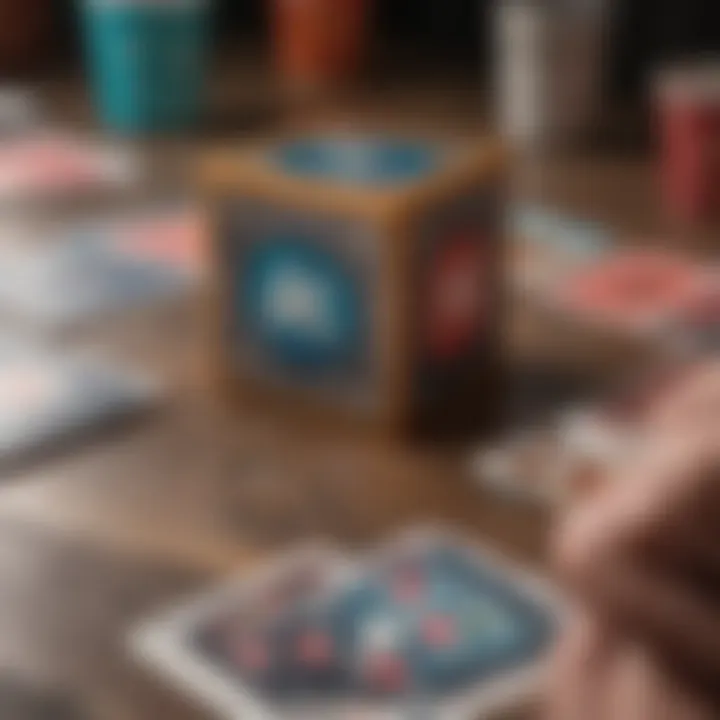Engaging Games to Boost Memory for Seniors


Intro
The topic of memory enhancement in the elderly is more than just a matter of curiosity. As the population ages, maintaining cognitive health becomes essential for overall well-being. Engaging activities can bolster memory function, offering seniors opportunities to connect and thrive. If you’ve ever shuffled cards around a table or participated in a lively game night, you know just how powerful games can be—not only for entertainment but for mental agility as well.
This article delves into the world of games specifically designed to improve memory among older adults. We will uncover findings from recent studies that underscore the benefits of these games and explore various formats, from classic card games to cutting-edge digital applications. Emphasizing the significance of group activities, we aim to highlight methods that keep seniors mentally sharp while making the experience enjoyable.
Memory is a complex cognitive process, and just like a muscle, it requires exercise to stay fit. By introducing specific games that stimulate different types of memory, we are not just engaging the elderly; we are also providing tools for caregivers and family members to help foster better cognitive health.
Recent Advances
As the landscape of cognitive research evolves, new approaches to enhancing memory in older adults emerge. Recent findings have shed light on how specific games can trigger neural pathways that fortify memory retention.
Latest Discoveries
Among the most recent discoveries is the connection between social engagement through games and cognitive function. Studies indicate that group games can significantly reduce feelings of isolation, thereby fostering an environment conducive to better memory function. A research study published in the Journal of Gerontology found that participants engaged in regular card game sessions showed measurable improvement in memory tests compared to those who did not participate in any social gaming.
Technological Innovations
In today's digital age, several applications aim to provide engaging and interactive memory-boosting experiences. Programs like Lumosity or Peak focus on tailored cognitive training that adapts to individual needs. These apps often track progress, making it easy to see improvement over time. Additionally, the versatility of online platforms allows seniors to play with friends or family members, maintaining social connections even from afar.
Methodology
Understanding how these games impact memory enhancement in the elderly involves rigorous examination of methodologies.
Research Design
Most studies employ a longitudinal research design, tracking participants’ memory performance over a period of months or years. This allows researchers to observe long-term effects of engaging with memory-enhancing games.
Data Collection Techniques
Data collection often utilizes a mix of quantitative and qualitative techniques. Cognitive testing, surveys, and interviews provide a comprehensive overview of the cognitive improvements as well as personal insights into player experiences. A noteworthy example includes a follow-up with participants who played group memory games, revealing personal narratives that highlight the emotional and cognitive boosts received from regular play.
Memory is not just about retention; it’s about connection, community, and the sheer joy of engagement.
This guide is as much a journey into the mechanics of memory enhancement as it is about creating enjoyable experiences for the elderly. By understanding both the research and practical applications of these games, we can be better positioned to support our loved ones in this crucial aspect of life.
Prelims to Memory Decline in the Elderly
Memory decline is something that many elderly individuals encounter as time goes on. This topic is crucial in understanding how cognitive functions change with age and how specific activities, including games, can support and enhance memory. Recognizing the phenomenon of memory decline is essential for caregivers and families to navigate this stage of life effectively. Addressing these matters can lead to better quality of life for older adults, keeping them engaged and mentally fit.
Understanding Memory Decline
Memory decline can be compared to a rusty old machine; without regular maintenance, it may not function at its best. Various factors contribute to this decline, including biological changes, environmental factors, and lifestyle choices. The most notable change that occurs is often in working memory and the ability to learn and retain new information.
As one ages, the brain might experience changes such as a reduction in neuroplasticity—the brain's ability to adapt and form new connections. This can result in forgetting names, misplacing items, or struggling to recall recent events. However, it’s important to note that not all memory decline is a sign of severe cognitive impairment or conditions like dementia. Some forgetfulness is a natural part of aging and can be mitigated through engaging activities.
To tackle memory decline, understanding the underlying causes is necessary. For instance, factors such as stress, lack of physical activity, and inadequate nutrition can exacerbate memory issues. Therefore, taking an holistic approach to mental health among the elderly is critical; integrating mental exercises, social interactions, and a healthy diet can produce significant improvements.
The Impact of Aging on Cognitive Functions
Aging has a multifaceted impact on cognitive functions. As people grow older, the brain undergoes a variety of changes, both structural and functional. Neurotransmitter levels—chemicals that communicate messages within the brain—fluctuate, often leading to slower processing speeds. Just like an old computer that takes longer to boot up, seniors might find it harder to retrieve information quickly.
However, it’s not all doom and gloom. Studies have shown that while speed may diminish, accumulated wisdom and experiences often enhance problem-solving skills and emotional regulation. The brain also retains the ability to create new neurons, a process known as neurogenesis, even in later years. Therefore, engaging in cognitive challenges can stimulate these processes, leading to improved memory function.
Games specifically designed for memory enhancement can help elderly individuals sharpen their cognitive skills. Such activities not only promote mental agility but also provide a social platform that can mitigate feelings of isolation and loneliness, which are often experienced in later life.
"Keeping the mind active with games not only enhances memory but also enriches social interaction among the elderly."
The Science of Memory Enhancement
Understanding the intricate relationship between aging and memory function is paramount as we explore the various games designed to enhance memory in the elderly. This section delves into the scientific principles that underpin memory enhancement techniques, particularly through engaging activities such as games. The insight into neuroplasticity and cognitive reserve theory presents a compelling groundwork for understanding how targeted practices can foster improvement in cognitive abilities.
When we consider memory enhancement, we are not just looking at temporary fixes; we aim for sustainable growth in cognitive capabilities. Games specifically designed for the elderly can serve as tools to promote neural connections, foster engagement, and ultimately provide a platform for cognitive health. As the elder population continues to increase, the importance of understanding these concepts becomes ever more pressing.


Neuroplasticity and Aging
Neuroplasticity is a fascinating concept that refers to the brain's remarkable ability to adapt and reorganize itself. This means that, contrary to the age-old belief that our cognitive abilities decline irreversibly as we grow older, research shows that our brains can continue to form new connections even in our senior years. Engaging in memory-enhancing games can stimulate this brain plasticity, allowing the elderly to strengthen existing neural pathways while creating new ones.
For instance, a game of Scrabble not only helps with vocabulary but also demands strategic planning, which can enhance cognitive flexibility. Likewise, playing Chess may sharpen problem-solving skills and improve memory recall through repeated practice and experience. These activities create a cognitive workout, leading to a more dynamic and resilient brain.
Key Points:
- Adaptation: Aging doesn't signify the end of learning; rather it signals a potential for adaptation.
- Engagement: Games that require active participation help maintain cognitive agility.
"Engagement in structured cognitive activities can mitigate some of the memory decline associated with aging, fostering a more vibrant lifestyle."
Cognitive Reserve Theory
Cognitive Reserve Theory posits that individuals with greater cognitive resources—whether acquired through formal education, engagement in complex activities, or social interaction—are better able to withstand age-related brain changes. This theory underlines the notion that people who regularly challenge their brains through games and puzzles may demonstrate better cognitive functioning despite the presence of age-related deterioration.
Engaging in diverse games—like Bridge, which demands attention and memory, or even newer digital puzzles—can build a cognitive reserve, thereby cushioning the elder against the impacts of decline. The more varied the engagements, the richer the cognitive reserve becomes. Activities that combine social engagement, strategy, and memory recall are especially beneficial, as they tap into multiple cognitive domains simultaneously.
Significant Insights:
- Dual Benefit: Games provide cognitive challenge while fostering social connections.
- Prevention: Maintaining an active intellectual lifestyle can serve as a robust buffer against memory decline.
Taking these theories into consideration, it's clear that memory-enhancing activities, particularly games, can pave the way for enhanced cognitive health among the elderly. The insights from neuroplasticity and cognitive reserve elucidate why such engagements are crucial, particularly in the context of our aging population.
Types of Games for Memory Improvement
Engaging in memory-enhancing activities is essential for older adults, as they can help maintain cognitive function and improve quality of life. Games offer a unique blend of challenge and entertainment that keeps the mind active, which can lead to improved memory retention, problem-solving skills, and even social interaction. Understanding the different types of games available allows caregivers and family members to select the best options tailored to the interests and capabilities of the elderly. Let's examine some popular types of games that can meaningfully contribute to memory improvement.
Traditional Board Games
Chess
Chess is more than just a game; it's a mental workout. Each move requires strategic thinking and foresight, and this level of cognitive engagement can stretch one's mental faculties. The beauty of chess lies in its complexity; two players can explore endless strategies to outsmart one another. This constant mental stimulation is particularly beneficial for older adults, as it encourages them to think critically and plan ahead. However, it can be intimidating for beginners, so patience is key when introducing it.
Scrabble
Scrabble brings words to life, making it a fantastic tool for improving vocabulary and cognitive agility. The game compels players to think quickly and recall their knowledge of words while also considering the best strategy for scoring. Its collaborative nature can foster social connections among players. A downside, though, could be the pressure some feel when trying to come up with words, so it’s essential to keep things light and fun.
Memory Match
This game is straightforward but effective for memory enhancement. Players flip over cards to find matching pairs, stimulating both recall and concentration. It’s adaptable in difficulty, making it suitable for those with various memory capacities. The downside is that it can become repetitive, so variations or themed sets can maintain interest and excitement over time.
Card Games
Solitaire Variations
Solitaire challenges players with its solitary nature; it forces them to strategize and plan in isolation. Variations like Spider Solitaire offer additional complexity, making the game both engaging and intellectually stimulating. Players develop patience as they work through their strategies. The downside? Longer rounds can sometimes lead to frustration, so encouraging breaks might be beneficial.
Bridge
Bridge is often described as a game that combines skill and partnership. This four-player game demands strategic teamwork and memory as players must remember which cards have been played. It also facilitates social interaction, making it a popular choice for groups. However, the learning curve is steep, which might deter some potential players from joining in right away.
Uno
Uno is not just for the young; this classic card game has a silly easy-to-learn format that can be enjoyable for people of all ages. The unique action cards often introduce an element of surprise, keeping the game dynamic. Despite its simplicity, Uno does not focus heavily on memory, so it might not be the best option for those seeking rigorous cognitive challenges. However, its social aspect can’t be ignored, as it brings laughter and interaction.
Digital Memory Games
Brain Training Apps
With technology touching every facet of life, brain training apps offer convenient cognitive workouts that are easily accessible. These apps provide a hailstorm of games tailored to improve memory and focus, allowing users to progress at their own pace. Their adaptability keeps the games fresh and engaging. Be mindful, though, that too much screen time can lead to eye strain, so balancing app usage with non-digital games is advisable.
Online Puzzles
Online puzzles not only sharpen problem-solving skills but also offer the joy of achievement when completed. Many puzzles can be customized in terms of difficulty, which makes them suitable for a variety of skill levels. Keep in mind, though, that internet connectivity issues may sometimes detract from an enjoyable experience.


Memory Challenge Games
These games are designed specifically to test and enhance memory, featuring a range of tasks that users must complete. They often include fun themes to make learning enjoyable. While they can be highly effective, some elderly individuals may find the fast-paced nature challenging. Hence, gradual introduction to their features might be necessary for optimal engagement.
Group Activities and Collaborative Games
Trivia Nights
These engaging formats are not only fun but also stimulate recall and discussion amongst participants, making them perfect for social interaction. Trivia nights can cover a wide array of topics, tapping into participants' interests and experiences. It’s a gathering that promotes learning through collective memory sharing. However, maintaining the pacing is crucial, as some participants might need more time to think about their questions beforehand.
Team Strategy Games
Working in teams to develop strategies allows players to engage collectively in problem-solving, which can lead to deeper social connections. The camaraderie built in these games often surpasses mere enjoyment, providing a sense of belonging. Nevertheless, it requires good communication skills, which may cause frustration for some members who struggle with this aspect of group interaction.
Storytelling Games
The creative aspect of storytelling games invites players to weave narratives, which can spark imagination and stimulate memory recall. Players often discuss shared past experiences that will benefit long-term memory. However, it may present a challenge for those who struggle to articulate thoughts clearly, which could lead to feelings of inadequacy. Creating a supportive environment is thus fundamental to foster participation.
Benefits of Playing Memory Games
Memory games offer a treasure trove of advantages, especially for elders grappling with cognitive decline. The brilliance of these games lies not just in their entertainment value, but in the multiple cognitive, social, and emotional benefits they bestow upon players. Engaging in memory-enhancing tasks can spark a renewed sense of purpose in older adults while providing a means to exercise their minds in a fun, dynamic way. This section investigates the various benefits that arise from participating in memory games, emphasizing why they should be a staple in the lives of the elderly.
Cognitive Improvement
Participating in memory games serves as a workout for the brain. Just like muscles need exercise, our brains thrive on regular activity to maintain their fitness. Cognitive improvement can manifest in several ways when older adults engage with memory-enhancing games. Research shows that memory games can lead to:
- Increased Neuroplasticity: As instruction sets and gameplay evolve, the brain adapts to new patterns and challenges, facilitating neural connections that bolster cognitive function.
- Enhanced Concentration and Focus: Many memory games require players to concentrate on tasks, thereby sharpening attention spans and improving the ability to focus on multiple activities simultaneously.
- Improved Strategic Thinking: Games that involve planning or problem-solving can help sharpen decision-making skills. Over time, this can contribute to better reasoning abilities.
These improvements are not merely theoretical; they are backed up by studies demonstrating the correlation between regular gameplay and enhanced cognition. In fact, a consistent regimen of cognitive activities can be a deterrent against memory-related ailments, potentially slowing down the onset of conditions like Alzheimer’s or dementia.
Social Engagement
Memory games can help break the ice in social settings, facilitating interaction among peers and family members. When older adults participate in gaming sessions, they aren’t just playing for fun; they’re building connections. Playing games together can foster:
- Stronger Relationships: Regular engagement in memory games can furnish opportunities for bonding, conversations, and shared laughter, which can deepen social ties.
- Community Building: Group games often offer a shared experience that can unite people around common interests, encouraging a sense of belonging among participants.
- Improved Communication Skills: During gameplay, participants explain moves, recount rules, and share stories related to the game, thereby enhancing their communication abilities.
Ultimately, social engagement ignites a spark in life’s mundane moments. Participating in memory games together can turn a quiet afternoon into an exciting adventure, fostering connections that counteract feelings of loneliness often experienced in older age.
Emotional Well-Being
Emotional well-being can often take a backseat as one grows older, but nurturing it is crucial for leading a fulfilling life. Memory games play a significant role in uplifting the spirits of elderly individuals. Through regular gaming, players can experience:
- Boosted Self-Esteem: Successfully completing a challenging game can lead to a feeling of accomplishment, sky-high self-esteem, and confidence in one’s abilities.
- Reduced Stress Levels: The focus required in games can serve as a stress-reliever. Immersing oneself in entertaining gameplay can be a form of escapism from everyday worries.
- Enhanced Mood: Engaging with others and sharing laughter during games can elevate mood levels. A good game can lighten hearts, creating a warm atmosphere filled with joy.
"Memory games are fun, but their impact resonates deeper—they can uplift moods, forge connections, and invigorate minds."
In summary, the benefits of playing memory games for the elderly encompass cognitive development, enhanced social connections, and positive emotional effects. By integrating these games into daily routines, older adults can reap the rewards, ensuring that their golden years are filled with laughter, learning, and connection.
Challenges in Implementing Memory Games
In the journey toward boosting cognitive health in the elderly through memory games, significant challenges often arise. Acknowledging these difficulties is essential, as addressing them can maximize the effectiveness of such games. By understanding the barriers that hinder participation and overcoming the resistance to new activities, caregivers, families, and professionals can pave the way for a more engaging cognitive experience. The benefits of memory games are traced back to the enhanced neuroplasticity they can foster, but these advantages will only be fully realized if the hurdles are approached with care and creativity.
Barriers to Participation
Barriers to participation can take many forms. Often, physical limitations play a crucial role. For instance, if an elderly individual has limited mobility or vision impairment, traditional board games may seem daunting. Such physical constraints can discourage engagement, leading to feelings of frustration or inadequacy.
Another considerable barrier is psychological; many elderly may feel intimidated by the complexity of certain games, especially digital applications which might look like a foreign language to them. A study indicated that around 39% of older adults felt overwhelmed by technology, which leads to a natural resistance against engaging in digital memory games.
Additionally, there is also the factor of social environment. An elderly person living alone or lacking an engaging circle may miss opportunities to partake in group activities, which are often more enjoyable and motivating. This isolation can serve as a barrier, inadvertently keeping them from the cognitive benefits that emerge from collective play.
Overcoming Resistance to New Activities
Resistance to new activities often stems from fear of failure or the unfamiliar. To combat this, introducing games gradually is key — starting with simple, familiar formats before venturing into more complex territories can make a world of difference. For example, playing a classic card game like Uno might encourage participation before gradually stepping up to something more mentally demanding, such as Scrabble.
Creating an inviting atmosphere is another fitting approach. When a memory game feels like a casual family gathering rather than an obligation, individuals are less likely to shy away. Using humor, vivid storytelling, or even music to set a lively tone can turn a potential chore into a delightful social event.


Furthermore, demonstrating the benefits of participation with light-hearted reminders can spark interest. For instance, showcasing how memory games enhance sharpness may just be an inspiring push for some. Emphasizing that cognitive benefits can lead to improved quality of life often stirs curiosity and engagement. Also, posting success stories on platforms such as Reddit can further resonate with everyday experiences.
"Every challenge is an opportunity. When we approach memory games with understanding and patience, we unlock doors to engagement we never thought possible."
Ultimately, while there are various barriers and resistance factors present in implementing memory games for the elderly, recognizing and creatively addressing these issues can substantially improve participation and enrich cognitive health. As we dismantle these barriers, the path to fun and engaging memory enhancement becomes clearer.
Best Practices for Engaging the Elderly
Engaging the elderly in memory-enhancing activities requires a thoughtful approach tailored to their unique needs and experiences. Addressing their comfort, familiarity, and personal preferences stakes a claim for their enthusiasm and active participation. Emphasizing the importance of these best practices not only helps in cognitive development but also fosters social interactions and emotional fulfillment among older adults.
Creating a Comfortable Environment
To foster an atmosphere conducive to engagement, the physical and emotional environment plays a pivotal role. Creating a comfortable setting means ensuring adequate lighting, minimal auditory distractions, and appropriate seating arrangements. This is crucial as clarity aids concentration and relaxation allows the mind to unwind.
Consider incorporating elements that resonate with the elderly’s tastes—soft pillows, familiar music playing in the background, and perhaps a mug of their favorite tea. All these factors create a welcoming ambience, making participation feel less like a chore and more like an enjoyable experience. Something as simple as a family photo or a piece of art can evoke nostalgic feelings, stimulating conversation and memory recall.
"A familiar environment can spark joy and connection, transforming routine activities into meaningful experiences."
Incorporating Familiarity
Using familiar games and activities stands out as an effective method to engage older individuals. Familiarity breeds confidence, and when seniors encounter games they already know, the anxiety of learning something new dissipates, paving the way for seamless participation. Card games like Bridge or classic board games like Scrabble often invoke delightful memories and can help rekindle social bonds.
Moreover, introducing variations of these games that align with their interests can also keep the experience fresh. For instance, a new twist on a traditional game can offer enough challenge to spark engagement while keeping the comfort of familiarity. Being part of recognized and cherished activities can enhance their motivation to participate and thereby boost cognitive benefits.
Tailoring Games to Individual Preferences
Individual preferences should never be an afterthought in engagement strategies. Each elderly participant brings their own set of interests, strengths, and limitations to the table. Understanding these personal inclinations allows caregivers and facilitators to customize activities that resonate deeply with the participants.
It’s advisable to have discussions beforehand about what kinds of games they enjoy. If someone has a penchant for puzzles, digital memory games such as Lumosity or Peak can be introduced, whereas others may find joy in storytelling games that allow sharing life experiences.
Focusing on strengths is equally essential. If a participant finds visual puzzles daunting, it may be better to invite them to team activities where they can play collaborative roles, fostering cooperation rather than competition. Tailoring activities to align with their interests can rekindle enthusiasm and accentuate cognitive benefits significantly.
In essence, engaging the elderly through memory enhancement games can vastly improve their quality of life. It requires not just selecting the right games but also understanding their comfort zones and preferences to foster an enriching experience.
Evaluating the Effectiveness of Memory Games
In the ever-evolving landscape of cognitive health, the need for evidence-based practices has grown remarkably. Evaluating the effectiveness of memory games plays a pivotal role in understanding how these activities can genuinely enhance cognitive function in the elderly. It provides not only a lens into the efficacy of these games but also offers vital insights that can refine and optimize how we engage with older adults. This examination further underscores specific benefits, considerations, and expectations surrounding memory enhancement through playful activities.
Measuring Cognitive Improvements
When we talk about cognitive improvements as a result of memory games, it is crucial to adopt a systematic approach. Researchers often employ various standardized tests and assessments to gauge these enhancements. The tests can range from simple memory recall tasks to more complex problem-solving exercises. Each one helps to shed light on how well the elderly can remember, learn new information, or even adapt to changing situations.
- Each participant’s baseline cognitive function is usually evaluated before they engage in these games. This establishes a control point, providing a clearer understanding of any substantial changes over time.
- Follow-up assessments are then conducted periodically. This way, any progress in memory abilities can be tracked, allowing for comparative analysis that may reveal patterns of improvement or stagnation.
The key takeaway is that measuring cognitive improvements transcends mere participation; it demands a holistic overview of individual progress over time. With careful analysis, caregivers can discern which games yield the most promising results. Moreover, understanding these changes can bolster the motivation of both players and caregivers alike, igniting a flame of excitement for further engagement.
Long-Term Benefits of Continued Engagement
Engaging in memory games is not a fleeting endeavor; the long-term benefits are substantial. The most compelling argument for regular participation lies in the brain's remarkable ability to adapt and grow. The theory of neuroplasticity posits that continued mental stimulation, such as memory games, results in the strengthening of neural connections over time. Furthermore, these enhancements don’t just stick around for a short while; they can lead to sustainable cognitive resilience.
Consider the following aspects of long-term engagement:
- Consistency and Routine: Just like exercise, making memory games a regular activity solidifies their benefits. A habit formed might even lead to unanticipated delights like social connections and knowledge sharing within peer groups.
- Health Outcomes: Studies have correlated consistent mental stimulation with lower risks of cognitive decline, such as dementia. Incorporating games into an elder's daily routine may act as a buffer against such age-related challenges.
"Engagement in memory games should not just be viewed as an activity but as an investment in cognitive health that yields benefits down the line."
Finale
In the grand tapestry of life, memory plays a crucial role, especially as individuals navigate the later chapters of their existence. This article underscores the significant impacts that engaging in memory games can have on elderly individuals. From cognitive enhancement to emotional benefits, there are myriad reasons to prioritize memory games within the daily routines of older adults.
Summary of Key Points
First and foremost, we've dived into the intricate relationship between memory games and cognitive functions. Traditional board games like Chess and Scrabble, as well as card games such as Bridge, have shown to be effective tools for cognitive engagement. Similarly, digital memory games provide a contemporary twist, making cognitive exercises more accessible and appealing.
Beyond just cognitive perks, it’s evident that these games also foster social connections and emotional well-being. Sharing a laugh during a game of Uno or collaborating in a trivia night can create an atmosphere of companionship, something that is vital for mental health as people age.
However, the path isn’t always smooth. Some elderly individuals might resist new activities. Strategies to overcome resistance, such as meeting them where they are—embracing both familiar and novel games—are essential. The conclusion here isn't just about playing games; it's about cultivating a routine that enhances the quality of life.
Future Insights into Memory Enhancement
Looking ahead, the realm of memory enhancement through games appears ripe with potential. As technology evolves, so does the landscape of cognitive training. Future developments in memory-related apps usage aim to personalize experiences based on individual cognitive profiles, potentially leading to more tailored cognitive improvements.
Researchers also indicate that there may be broader implications for memory games. Integrating physical exercise with memory tasks could amplify cognitive gains, suggesting that an all-encompassing approach might yield the best results for elderly population.
In summary, the integration of games into the lives of the elderly is not merely a recreational pursuit but a vital strategy for enhancing memory and overall well-being. As caregivers, family members, and professionals, embracing these activities can carve pathways for brighter cognitive futures—one game at a time.















